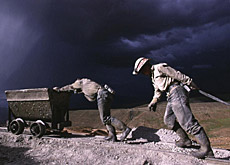
Business urged to help resolve conflicts

A Swiss-backed United Nations study has called on big business to do more to help resolve some of the world’s conflicts.
Enabling Economies of Peace sets out directives to encourage the rebuilding of economies in conflict countries and to prevent the exploitation of natural resources such as oil and gas.
The report, co-financed by Switzerland, was unveiled at a meeting at the UN’s headquarters in New York on Thursday.
It forms part of the UN Global Compact initiative, a voluntary pact between governments and the private sector aimed at improving human rights, environmental protection and working conditions. At least 16 Swiss multinationals have signed up.
The study said that oil, minerals, gas, petrol and other raw materials were often the source of conflicts around the globe or heavily influenced them.
It went on to identify a range of “concrete actions” to help affected economies develop peacefully and to encourage companies to act in a more “conflict sensitive” way when doing business in these regions.
Primary materials
“When access to primary materials is being discussed, business representatives must be sitting next to governments during the talks,” said Peter Maurer, the Swiss ambassador to the UN in New York, who was present at the meeting.
Maurer also stressed that a peace-building commission, one of the UN reforms proposed by Secretary-General Kofi Annan last month, would be ideal for overseeing collaboration between the private and public sectors.
“In recent years a growing number of companies have realised that it is in their enlightened self-interest to adopt a conflict-sensitive approach to minimise the risks they face in the global marketplace,” added Georg Kell, head of the UN Global Compact.
“But to succeed, governments must provide wider public policy frameworks,” he added.
Cautious welcome
Non-governmental organisations cautiously welcomed the move, but said they were not convinced of the merits of the Global Compact programme as a whole.
“We are rather critical of the Global Compact programme because it is not very binding and because some companies can profit from it to improve their image without making much of an effort,” Peter Nigli, director of the Swiss Coalition of Development Organisations, told swissinfo.
“But the fact that the role of the economy is being discussed within the framework of the Global Compact could be positive for promoting peace and the resolution of conflicts,” he added.
The Global Compact initiative was launched by Annan at the World Economic Forum in Davos, Switzerland, in 1999. In all, 2,000 companies worldwide have entered into the pact.
In Switzerland they include food giant Nestlé, pharmaceuticals multinational Novartis and banks UBS and Credit Suisse.
They have agreed to promote the Global Compact’s ten principles on a more humanitarian approach to doing business. This includes combating corruption and supporting human rights and environmental protection.
swissinfo with agencies
The Global Compact is a pact between governments and the private sector.
It was created by UN Secretary-General, Kofi Annan, at the World Economic Forum summit in Davos in 1999.
It is based on ten key principles concerning human rights, working conditions, environmental protection and combating corruption.

In compliance with the JTI standards
More: SWI swissinfo.ch certified by the Journalism Trust Initiative




























You can find an overview of ongoing debates with our journalists here . Please join us!
If you want to start a conversation about a topic raised in this article or want to report factual errors, email us at english@swissinfo.ch.